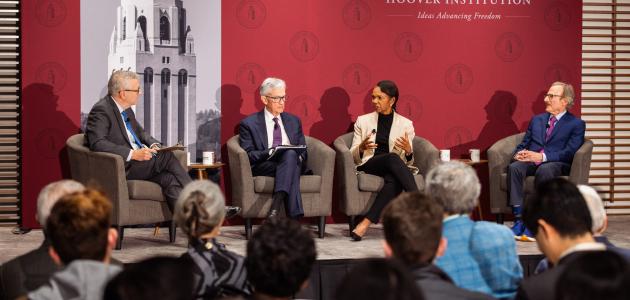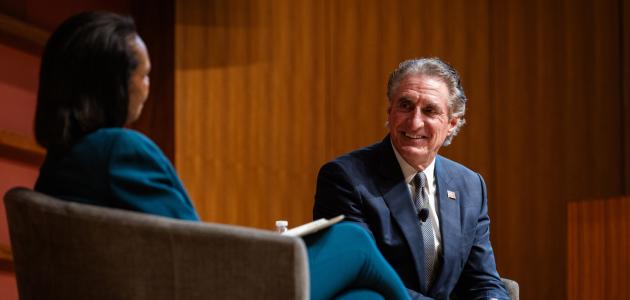A weekly digest of the latest news and research related to the work of the Technology, Economics, and Governance Working Group. Topics covered in the digest include cybersecurity, domestic regulation, innovation, international competition, social media disinformation, and the California exodus.
This week’s roundup covers Turkey’s opposition to Sweden and Finland’s bids for NATO membership, President Biden’s trip to Asia, external threats to the African economy, Chinese hackers’ actions targeting Russian tech, and continued federal and state battles to regulate big tech and Americans’ changing views of the regulatory environment. Additionally, online communities may be encouraging lone-wolf extremists, the US military leverages AR for training, startups feel the pain of increasing VC scrutiny, and a Tesla driver will go to trial for vehicular manslaughter. Take our reader survey to share your feedback about the News Roundup!
Industrial Policy, International Competition, and Cooperation
NATO chief sure spat over Sweden, Finland will be resolved | Associated Press
On Thursday, NATO Secretary-General Jens Stoltenberg expressed confidence that Turkey’s resistance to Sweden and Finland’s bids to join the alliance will be diplomatically resolved and that Istanbul’s opposition will not be a lasting obstacle. President Erdogan has said that Turkey would veto Sweden and Finland’s applications, citing the countries’ alleged support for the Kurdistan Workers’ Party and 2019 arms restrictions imposed on Istanbul over its incursion into Syria. NATO’s consensus-based decision-making process means that any policy must receive unanimous backing from all of its members.
5 challenges awaiting Biden on his Asia tour | Politico
On Friday, Biden will depart for Asia for the first time as president. His four-day visit includes stops in Tokyo and Seoul—where he will meet with Prime Minister Fumio Kishida and President Yoon Suk Yeol—as well as a conference with the leaders of the Quadrilateral Security Dialogue. The Biden Administration’s primary focus is strengthening America’s Indo-Pacific partnerships so that the United States continues to lead a unified effort against Chinese and North Korean threats. The President is also expected to officially launch the Indo-Pacific Economic Framework, a regional trade initiative designed to renew America’s multilateral economic strategy in Asia.
Dawn of a second Cold War and the ‘scramble for Africa’ | Brookings
In early 2021, the African Continental Free Trade Agreement (AfCFTA) introduced a new economic framework that could revitalize industry in dozens of developing countries and gradually reverse longstanding wealth inequalities that face the continent. However, increases in violent conflict fueled by great power competition and domestic instability threaten to undermine many of Africa’s burgeoning economic advantages. As a result, many African nations have elevated defense spending at the expense of development investments. To develop a culture of accountability, the report recommends that local leaders prioritize social reforms to strengthen democratic governance and judicial independence while working to improve regional multilateral security cooperation.
Domestic Regulation
US senators target Big Tech's digital advertising machine with new legislation | CNN
Senators Mike Lee, Amy Klobuchar, Ted Cruz, and Richard Blumenthal introduced a bill on Thursday targeting tech giants that maintain vertically-integrated control over large digital advertising ecosystems. The Competition and Transparency in Digital Advertising Act aims to eliminate conflicts of interest when tech companies with integrated oversight over both the buying and selling of operation ad service networks engage in self-dealing. The legislation imposes ownership restrictions on companies that earn over $20 billion in yearly digital ad revenue. Firms that report at least $5 billion would be held to certain transparency standards and legally required to prevent conflicts of interest.
Support for more regulation of tech companies has declined in U.S., especially among Republicans | The Pew Research Center
According to a recent analysis by the Pew Research Center, the percentage of Americans in favor of increased tech regulation has declined since last year from 56% to 44%, and the share of Americans who prefer less government regulation jumped from 9% to 20%. A partisan breakdown of the data revealed that the trend was most prominent among Republicans and right-leaning independents, whose support for regulation dropped dramatically while their perceptions of increased political censorship by social media platforms grew. The percentage of Democrats satisfied with the current level of tech regulation increased from 23% to 32% but was not accompanied by rising demands for less regulation.
Innovation
The US Military Is Building Its Own Metaverse | Wired
The American military has embraced virtual and augmented reality technologies as part of an ongoing effort to build a ‘metaverse’ that will utilize recent technological advancements to enhance training and combat operations. For instance, fighter pilots can now run mock sorties against AI enemies by wearing AR headsets during flight—an experience far more immersive and realistic than a traditional flight simulator. Despite the hype, some experts have more measured expectations about the future of cutting-edge defense technology. They caution that introducing unnecessary complexity into systems that already function well could be a mistake.
For Tech Startups, the Party Is Over | The Wall Street Journal
The flood of cheap capital fueled by fiscal stimulus and years of low-interest rates that sustained explosive startup growth throughout the pandemic has ended. New economic pressures have driven venture capitalists to scrutinize new firms far more closely than last year. This year’s correction was preceded by a lengthy period of zealous VC investment and heavily inflated valuations.
Cyber
Chinese Hackers Tried to Steal Russian Defense Data, Report Says | The New York Times
A report by Check Point, an Israeli-American cybersecurity firm, includes evidence that China launched a cybercampaign against Russia targeting institutions that research airborne satellite communications, radar, and electronic warfare. The report says that China began the operation months before Russia invaded Ukraine but continued its activities even as China’s leaders publicly expressed solidarity with Moscow. Earlier this year, the hackers sent phishing emails to Russian defense officials impersonating Moscow’s Ministry of Health and claiming to have “a list of persons under US sanctions for invading Ukraine.”
State & Local
Driver must stand trial for deadly Tesla crash in California | ABC News
A Los Angeles judge ruled this week that a driver of a Tesla Model S will go to trial on two felony counts of vehicular manslaughter after a 2019 crash. The vehicle’s automated driving features were active but data suggests that neither the Autopilot system nor the driver activated the breaks in the minutes leading up to the accident. While US drivers using automated systems have faced criminal charges before, this is believed to be the first felony prosecution. Tesla warns drivers that its vehicles are not intended for fully autonomous operation.
Freedom of Speech, Domestic Democracy, and Extremism
A ‘Lone-Wolf’ Shooter Has an Online Pack | The Atlantic
Juliette Kayyem, a former assistant secretary for homeland security under President Obama, discusses the recent white supremacist terror attack in Buffalo, New York. She warns that lone-wolf extremists, instead of acting alone as their label suggests, are actually part of a growing digital ecosystem that perpetuates racist ideologies and conspiracy theories and encourages extremists to carry out violent acts.
Here's why tech giants want the Supreme Court to freeze Texas' social media law | NPR
Several major tech companies have asked the Supreme Court to block a 2021 Texas law intended to prohibit social media platforms from censoring content based on users’ political viewpoints. The law had been suspended due to legal challenges until last week when it was ruled to be enforceable by the Fifth Circuit Court of Appeals in New Orleans. By allowing users to sue platforms for political censorship, some fear that the law would mean that content moderators would be forced to allow a flood of harmful, yet legal content onto their platforms.













